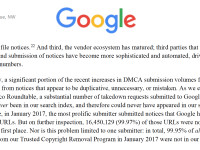The International Intellectual Property Alliance (IIPA), a lobby group that represents the major lobbying associations for music, movie, software, and book publishing in the United States, has released its submission to the U.S. government as part of the Special 301 process. The Special 301 process leads to an annual report invariably claiming that intellectual property rules in the majority of the world do not meet U.S. standards. The U.S. process has long been rejected by the Canadian government, which has consistently (and rightly) stated that the exercise produces little more than a lobbying document on behalf of U.S. industry. The Canadian position, as described to a House of Commons committee in 2007 (and repeated regularly in internal government documents):
In regard to the watch list, Canada does not recognize the 301 watch list process. It basically lacks reliable and objective analysis. It’s driven entirely by U.S. industry. We have repeatedly raised this issue of the lack of objective analysis in the 301 watch list process with our U.S. counterparts.
The lack of credibility stems in part from the annual IIPA submission. While the submission generates some media attention, this year’s falls squarely into the category of fake news. The IIPA focuses on three concerns: piracy rates in Canada, the notice-and-notice system for allegations of infringement, and fair dealing. None of the concerns withstand even mild scrutiny and each is addressed below.











